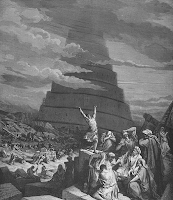
How would you handle the following situation; a story from the good book John, chapter 8...
One time a group of card-carrying Old Testament doctrinaires and Jesus doubters interrogated Jesus pretty heavily, and he rolled with the punches, answered calmly and in kind (though cryptically of course). But he referred to himself several times as being personally sent to Earth by God, and the mob eye-rolling and head shaking intensified.
And then when he told this gathering of experts that he'd been around since before Abraham - the great patriarch of their Israelite and Jewish lineage - well, the inquisitors had had enough. So in keeping with Moses' level-headed, fair and judicious laws, they picked up a bunch of rocks and were about to lay some good ole fashioned Mosaic justice on this upstart rabbi from Nazareth, by stoning him to death for his heresy.
And what did Jesus do?
"Jesus hid himself, slipping away", the Bible claims.
Would you hide and slip away?
I wouldn't, not if I were the incarnation of Almighty God on Earth, the Savior of Mankind, Deus Postestas In Terra. And you wouldn't either...would you?
Look closely: if you could walk on water, change the course of Nature, raise the dead, and you'd been around since the Universe was born...would you actually run and hide from a band of loudmouth rock-throwers?
You kidding me? Using miraculous power - as Jesus did many times - you'd simply calmly supremely stand tall as the rocks hit you...but with no effect, yes? Or... you'd stop the stones in flight (like bullets in The Matrix Reloaded - cool!), or evaporate them, or turn them into flower petals, or allow the stones to bounce and turn back toward your accusers.
Now wouldn't such miracles surely convince these skeptical accusers? And wouldn't they then become believers to further spread the Good News? No better witnesses than former disbelievers; Saint Paul comes to mind.
(Why bother to convince them? Part of Jesus' self-described mission included the declarations, "I did not come to call the righteous, but sinners," and "I was sent only to the lost sheep of Israel". Would you abandon a prime teaching moment toward these sinners and liars, these pathetic Pharisees and lost Israelite sheep, to save your immaculate skin?)
To reiterate: I'd run and hide from anyone about to throw rocks at me. So would you. But would God incarnate? After all, God incarnate (AKA Jesus) rightly protected a woman from being stoned, just a few verses earlier in John 8. And that was by the force of simple rhetoric; Let him who is without sin cast the first stone.

Imagine the effect if you, as Jesus, had stood unharmed as the rocks flew, fixing your transcendent stare on the rabble; grieved, disappointed, understanding...and forgiving...






